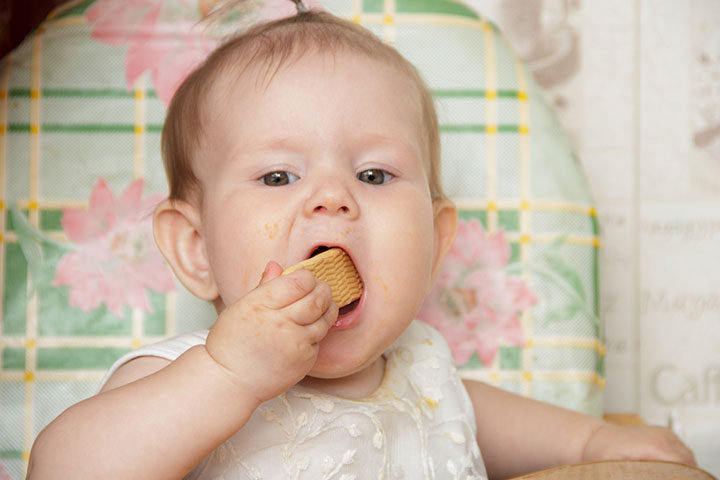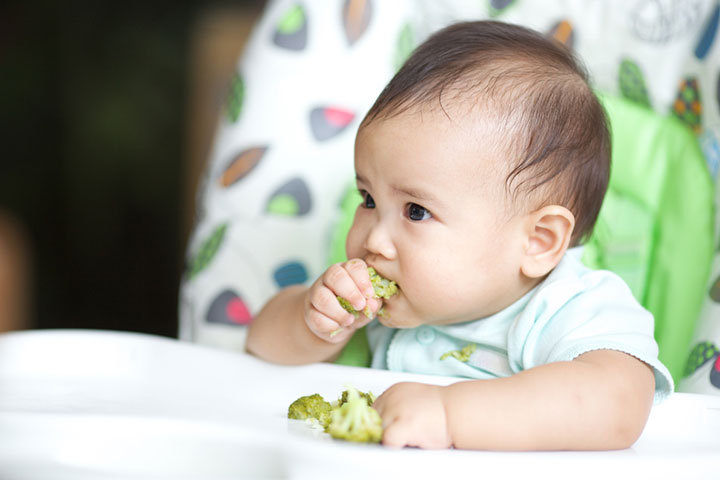Even before they start eating solid foods, you may notice your baby gagging. While gagging, food or an object is pushed back from the throat into the mouth. It is a highly sensitive reaction frequently elicited in young infants to prevent choking. However, it gets less sensitive with age (1).
Although it is a protective response, it can cause feeding and drinking problems in babies and may lead to nutritional inadequacies if gagging occurs frequently. In addition, frequent gagging in babies older than 4–6 months can indicate underlying medical conditions or improper feeding techniques (1). Therefore, if your baby gags frequently, you should see a pediatrician.
This article discusses the cause of gagging, preventative strategies for frequent gagging, and how to distinguish between choking and gagging in babies.
Is Gagging Good For Babies?
Gagging plays an essential role in protecting your little one who is learning eating and drinking skills. Gagging protects from choking, which means most babies gag on foods that they are not able to chew or swallow.
If a baby is unable to gag food or any foreign bodies kept in their mouth, it could slide down to their throat and reach the airways. Aspiration of food to the lungs can result in aspiration pneumonia. A piece of food or toy could be life-threatening if it leads to airway obstruction.
When And Why Do Babies Gag?
Occasional gagging is normal in young babies. This helps infants throw up the pieces of food that are big to swallow. Faster milk supply and overfeeding or being too full may also cause young infants to gag during bottle-feeding or breastfeeding.
Your little one is most likely to gag in the following situations.
- While breastfeeding
Gagging on breast milk can be due to overactive letdown of milk. Getting help from a board-certified lactation consultant can be useful to manage breastfeeding difficulties.
- While bottle-feeding
Incorrectly sized bottle nipples can be a significant reason for gagging while bottle-feeding. The texture of bottle nipples varies, and often oversized bottle nipples can stimulate gag reflex in babies. Larger holes in the feeding bottle may also cause gagging due to more food coming into the mouth, making it difficult to swallow at a time.
- Teethers and mouthing toys
Chewing on various toys and teethers can often cause a gag reflex in some babies. Gagging may often happen in the initial days when they start mouthing the toys. You may notice the sensitive gag reflex disappears over time.
- Solid foods
Most infants may have an occasional gag on solid foods. Eating is a skill that develops over time, and it takes time to coordinate chewing and swallowing. The thick texture of food can be a reason for gagging in babies since it is difficult for them to chew and swallow. However, pureed baby food may also cause occasional gagging due to poor eating skills.
Is It Normal For Babies To Gag Frequently?
Frequent gagging may not be normal in most cases. Excessive gagging can be due to the following reasons (2).
- Lack of coordination of oral motor skills. The coordinated movement of tongue and jaws to chew and swallow is known as oral-motor or oromotor skills. Babies could gag while eating due to poorly developed oromotor skills. Most babies will learn eating skills as part of their development. Babies with neurological disorders and structural abnormalities may fail to reach this developmental milestone and often require additional interventions and training.
- Sensory issues with food may also cause gagging. Babies who experience gagging due to oral-sensory issues usually begin to gag while consuming foods with a specific texture.
- Improper feeding positions and techniques may also cause gagging in babies.
- The hard or thick texture of food, overfeeding, or feeding more quantity per bite or spoon could also make your little one gag since they are unable to chew and swallow.
Note: Baby gagging does not depend on the presence or absence of teeth. It is a common belief that babies require teeth to eat, but they can eat using their strong gums.
Is Your Baby Gagging Or Choking?
Gagging and choking are not the same. Gagging is a protective reflex that prevents a baby from choking, whereas choking can be life-threatening if left unattended. Gagging is common and normal while your baby learns to feed themselves. It is essential to differentiate between gagging and choking in babies since choking requires immediate attention (3).
Gagging can happen when babies have something or even nothing in their mouths. Just like adults, babies and toddlers may also gag when they see the food they dislike, or when they eat something new and unfamiliar. In contrast, choking means something is already in the upper airways, and the baby cannot get that out.
Gagging vs. choking
| Gagging | Choking |
|---|---|
| The face may look bright red and open mouth with tongue thrust forward. | The lips may turn blue. |
| Splutter or cough can be seen as they clear the food. | Silent, often unable to make noise. |
| Babies have a hyper gag reflex to protect themselves from choking. | Choking is accidental, and it is not a protective reflex. |
| Do not interfere while gagging, they can manage Interfering may cause choking. | Do first aid to dislodge the food or any obstructive material from the airways. |
Note (4):
- If your baby is red and loud, they may be gagging; let them work to clear it.
- If your baby is blue and silent, they may be choking, and they need your help. If the foreign body is not dislodged from the airway, seek emergency medical assistance.
An infant who is choking may not be able to breathe or produce sound. They need first aid such as back blows or chest thrusts to remove food stuck on the airway. If the baby loses consciousness, you should stop back blows or chest thrusts and call 911 immediately.
Based on the statistics from the US Centers for Disease Control and Prevention (CDC) study cited by the American Academy of Pediatrics (AAP) policy statement “Prevention of Choking Among Children” (2020), the graph below illustrates the occurrence of fatal choking in young children. The data reveals that 65% of children aged 35 months and under experience fatal choking accidents.
Incidence of fatal choking in young children
Source: Childhood choking: An overview; Texas Health and Human Services/CDC/AAP
Thus, learning about first aids for choking in infants and CPR techniques can be helpful for parents. Knowing how to identify and handle emergencies could help parents and caregivers act immediately.
What Should You Do When Your Baby Gags?
If you are sure that your baby is gagging, do not do anything, and remain calm. Let your baby gag and throw up the food that they are unable to swallow. Interrupting while gagging may result in choking, so let your little one use their protective reflex.
You may help them lean forward if there is continuous gagging. This could help them bring the food from the back of their mouth to the tongue and spit it out. If the baby is gagging and unable to push food out, you may use your little finger to sweep out the food from their tongue.
Letting them relax before resuming feeding could be ideal.
When Should You Worry?
Frequent gagging should be mentioned to the pediatrician on the next visit. Doctors can diagnose the causes of constant gagging.
If your baby has frequent gag interfering with their food and water intake, seek a pediatrician’s evaluation. Early identification of feeding problems and feeding therapy initiation could prevent growth restrictions due to lack of nutrition. Early feeding therapy may also have more favorable outcomes than delayed approaches.
How To Prevent Gagging In Babies?
Although gagging is a protective reflex, frequent gagging could interfere with feeding and may lead to nutritional deficiencies and growth delays. Moreover, the feeding method or type of foods that causes gagging could also increase the risk of choking in babies.
You may try the following tips to prevent gagging while feeding.
- Let your baby feel relaxed before feeding.
- Never force them to eat more than they need or desire.
- Choose the right feeding bottle. Seek expert help to choose the bottle size, nipple length, and the bottle hole size appropriate for your baby’s age and feeding skills.
- Ensure your baby is able to sit upright on the feeding table before starting a solid diet. Most babies can be weaned around six months of age.
- Use a feeding table to keep your baby in an upright position while eating.
- Do not encourage feeding solids in lay down position or while playing.
- Babies may not be able to swallow a lot of food. Give a small amount of food on a spoon to the front of the baby’s tongue rather than a spoonful of food to their mouth. This method lets your baby suck the spoon for food without stimulating their gag reflex.
- Once your baby is ready to eat table food other than purees, you may cut their food into small bite-size pieces.
- Avoid foods, such as nuts, popcorn, and whole grapes, that can be a choking hazard.
If your baby has frequent gagging on pureed soft foods, while bottle-feeding, or while breastfeeding, seek medical care to identify the underlying causes.
You may look for oversupply or too fast let down of breast milk if your baby is frequently gagging or choking while breastfeeding.
Is Gagging A Sign Of Gastroesophageal Reflux Disease?
Gastroesophageal reflux disease (GERD) or acid reflux can be a reason for gagging in some babies. Infants younger than three months may spit up or vomit (also called posseting) a few times a day due to an immature digestive system. However, it does not cause any problems, and the baby usually outgrows it within a year (5) (6). When normal gastroesophageal reflux (GER) or spitting up becomes severe or chronic, then it may indicate GERD. When a baby has reflux, issues such as newborn gagging in sleep are also common.
You may notice other signs of acid reflux, such as abdominal discomfort or frequent coughing, along with gagging if GERD causes it. Acid reflux may often result in frequent gagging, and you may seek medical care for an exact diagnosis.
It can be tough for parents or caregivers to watch a baby gagging on food or breastmilk and so, they tend to have an emergency response to the situation. However, it is a protective mechanism to prevent choking. Babies may gag more during the initial weeks of solid food and gradually learn to eat. Through gagging, they clear their throat, preventing food from entering the airways. It is important to differentiate between gagging and choking in babies since choking requires immediate help. Lips may turn blue and not make noises while chilling, and you may dislodge food from their throat using various methods.
Key Pointers
- Gagging, or gag-reflex, is important as it prevents babies from choking on hazardous food or objects.
- Occasional gagging is normal in newborns.
- Bluish discoloration of the lips, inability to make noise, etc., are some signs of choking.
In this video, you will learn about babies gagging on food and understand why it’s actually a good thing. Know how their bodies are learning to protect them from choking.















